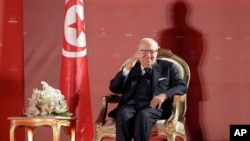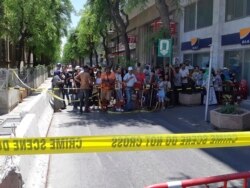Double suicide attacks shook Tunisia's capital Thursday, even as the country was plunged into uncertainty with the hospitalization of President Beji Caid Essebsi who was said to be in "critical condition".
The violence revived fears for the stability of the North African state, which is seen as a rare democratic success story of the Arab Spring uprisings but has been hit by repeated Islamist attacks.
Thursday's blasts – one on a central avenue and another against a security base – killed a police officer and wounded at least eight people including several civilians, the interior ministry said.
An AFP correspondent saw body parts strewn in the road around a police car after the first attack, which took place on Habib Bourguiba, a central avenue near the old city.
The interior ministry said one policeman died from his wounds after that attack, while another policeman and three civilians were wounded.
"It was a suicide attack, which took place at 10:50 (0950 GMT)," interior ministry spokesman Sofiene Zaag told AFP.
Half an hour later, the second attack targeted a base of the national guard in the capital and wounded four security personnel, according to the ministry.
"An individual blew himself up outside the back door" of the base, wounding four security personnel, Zaag said.
The suicide bomber detonated a device at the Gorjani complex, which houses the national guard, judicial police and the anti-terror branch, Zaag said.
Just hours after news of the attacks broke, the presidency announced that Essebsi "was taken seriously ill and transferred to the military hospital in Tunis".
Key adviser Firas Guefrech described the 92-year-old leader as in "critical condition".
Essebsi, the country's first democratically elected president, came to power in 2014, three years after the Arab Spring uprising toppled longtime dictator Zine El Abidine Ben Ali and sparked revolts in several Arab nations.
No immediate claim
There was no immediate claim of responsibility for the attacks.
Civil protection units and police rapidly deployed to Habib Bourguiba avenue, where the interior ministry is located.
People initially fled in panic, before some crowded around the scene of the attack, expressing anger against the authorities. Shops and offices were closed by police.
The twin attacks came ahead of presidential and legislative elections, scheduled for October and November.
In April Essebsi said he did not plan to stand for re-election in order to make way for someone younger.
Tunisia, the cradle of the Arab Spring uprisings, has been hit by repeated Islamist attacks since the 2011 overthrow of Ben Ali.
On October 29, 2018 an unemployed graduate blew herself up near police cars on Habib Bourguiba, killing herself and wounding 26 people, mostly police officers, according to the interior ministry.
The Tunisian authorities said the suicide bomber had sworn allegiance to IS.
The attack was the first to rock the Tunisian capital for over three and a half years.
In March 2015, jihadist gunmen killed 21 tourists and a policeman at the National Bardo Museum in Tunis.
In June that year, 30 Britons were among 38 foreign holidaymakers killed in a gun and grenade attack on a beach resort near the Tunisian city of Sousse.
And in November 2015, a suicide bombing against a bus carrying presidential guards killed 12, in an attack claimed by IS.





